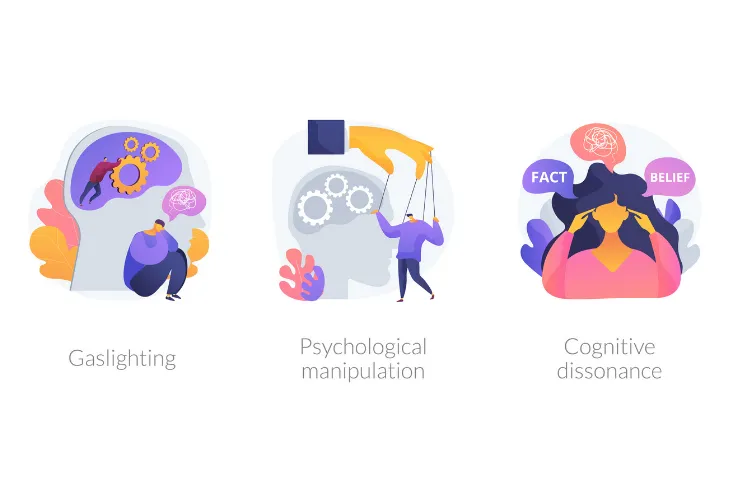- Gaslighting is a type of psychological manipulation that aims to control another person.
- It can be incredibly distressing so it’s important to know how to respond.
- While there are a variety of ways to deal with gaslighting, sometimes the safest way is to remove yourself from the situation.
Gaslighting is a form of psychological manipulation. The gaslighter uses a variety of tactics to try and control another person. While it’s commonly seen in relationships and friendships, it can also occur in the workplace and sometimes even at the doctor’s.
Gaslighting can be extremely distressing for the victim too. Left unaddressed, it can lead to anxiety, depression, and trauma so it’s important to know how to respond. Here’s a look at what gaslighting is, the common signs to watch for, and seven ways to respond and take back control.
What Is Gaslighting?
Gaslighting is a form of psychological abuse where a person or group causes an individual to question their own thoughts and perceptions of reality, according to Medical News Today. Gaslighting is a form of manipulation that often occurs when a person tries to assert control over another. Those who experience gaslighting may question their own sanity and feel confused and anxious.
Gaslighting can happen in many different situations whether it be in the workplace, in a romantic relationship, by a family member, by a medical provider, or by a long-term friend. It’s important to know how to respond to gaslighting and be aware of the signs to ensure you’re best equipped on how to respond confidently and effectively.
Examples of Gaslighting
Gaslighting can happen in a variety of ways, and in a range of different scenarios. Medical News Today explains that some common types of gaslighting include:
- Countering: This form of gaslighting is when someone questions another person’s memory of an event. They may make comments such as “I don’t think you’re remembering properly” or “Are you sure about that?”
- Withholding: This is when an individual pretends to not understand the situation, refuses to listen, or adds doubt to the situation. They might say, “I don’t know what you’re talking about.”
- Trivializing: This is a form of gaslighting where a person will disregard or belittle another person’s feelings. They may accuse them of overreacting or being too sensitive.
- Denial: This occurs when a person does not take responsibility for their actions. They may say they did not do something they did, blame their behavior on someone else, or pretend to forget what happened.
- Diverting: This form of gaslighting is when a person shifts the focus of a conversation to questioning the other person’s credibility. They may question their facts or the source they received the information from to avoid taking accountability.
- Stereotyping: This is when an individual will intentionally use negative stereotypes about a person’s identity to gaslight them. This could be gender, race, ethnicity, age, or sexuality.
What Drives Gaslighting?
The cause of gaslighting can vary depending on the situation, but it’s often a learned behavior. Medical News Today explains that gaslighting is a tactic used to gain control. Those who gaslight may feel entitled to satisfy their own wants and needs over those of others. Additionally, those who gaslight, often do not have a strong sense of self.
It’s also common for those with personality disorders, such as narcissistic personality disorder (NPD), to exhibit gaslighting. It’s important to note that while this is common, gaslighting is not always due to a mental health condition, anyone may engage in this behavior.
How to Respond to Gaslighting
Being the victim of gaslighting can have a significant effect on mental health. Because of this, it’s important to make yourself aware of the signs and symptoms so you can recognize gaslighting and know how to respond effectively.
Health explains that when a victim tries to defend themselves, it can often be triggering for the gaslighter. This is often a losing game and may further instigate gaslighting by the person responding saying you’re acting crazy or being hysterical. Because of this, rather than immediately trying to defend yourself, it’s often recommended to take a step back, stay calm and open a conversation in a non-threatening way.
It’s also important not to second guess yourself and fuel the gaslighting. Follow along as we break down further steps to respond to gaslighting in an effective way.
Recognize the Signs of Gaslighting
First and foremost, it’s important to learn the signs of gaslighting so you can recognize when it’s happening to you. It’s common for victims to not realize when gaslighting is happening to them because they may trust the abusive person or believe they truly aren’t remembering events correctly. Gaslighting often starts small before it eventually becomes a repeated pattern of manipulation. With that being said, just because someone has a different opinion than yours doesn’t necessarily mean it’s gaslighting.
To evaluate the situation and determine whether you are experiencing gaslighting, it’s important to check in on how you’re feeling. Some common signs that someone may be gaslighting you is if you feel uncertain of your perceptions, question if you are remembering things correctly, believe you are irrational, feel incompetent or unconfident, constantly apologize, defend the abusive person’s behavior, and become withdrawn or isolated from others.
Take Space From the Situation
Once you recognize the signs of gaslighting, it may be helpful to take space from the situation. Healthline explains that it’s normal to feel angry, frustrated, or sad when you realize you may be experiencing gaslighting, but it’s important to remain calm to handle the situation effectively. Defending yourself or fighting back may actually escalate the situation, so keeping calm can help you focus on your truth with confidence.
To get physical space from the situation, it might be best to suggest taking a break and revisiting the topic later. You could go for a walk or step outside to give your mind a break. If you are unable to physically remove yourself from the situation, try to practice breathing exercises, slowly counting to 10, or repeating positive affirmations.
Document Your Interactions
Healthline explains that it might be helpful to collect evidence to make sense of the situation. This would involve documenting your interactions with the gaslighter so you can track what’s really happening afterward. They may even deny the conversation at a later date, so this documentation will allow you to refer to the truth of the events from your perspective.
You can document your interactions by taking screenshots of texts or emails, taking photos, noting dates and times of conversations, or summarizing conversations in a journal and adding direct quotes. Since it may not always be safe to defend or confront yourself in these situations, having a record of evidence can help boost your confidence and support your well-being.
Speak Up
Gaslighting is an effective manipulation tactic because it tends to confuse and shake the confidence of the victim. But if you’re aware of the gaslighting and show that the behavior isn’t bothering you, it may help stop the behavior of the abuser.
If the gaslighting escalates to criticism and insults, you may want to consider calling these out in a calm and assertive way without expressing anger. Be sure to communicate that you won’t accept the behavior and make others aware of the situation. Communicating your boundaries and bringing attention to the gaslighting in a calm way may help the abuser realize these strategies will not work on you.
Remain Confident in Your Version of Events
When you’re being gaslighted, it’s easy to second-guess your version of events but it’s important to remain confident. Healthline says gaslighters want you to doubt your reality — it’s one of the ways they manipulate you.
The source explains that it’s completely normal to misremember small details like the color of someone’s shirt, however, if you remember an event clearly and they deny your memory, that’s considered gaslighting. But remember, you know what happened. Repeat the events back to yourself calmly and with confidence.
The source also says if you’re able to provide any type of proof, it may “encourage them to back down.” If this doesn’t work, and they continue questioning you, don’t let it lead to conflict. Arguing can cause more tension, which can put you in a vulnerable place to be manipulated. Instead, calmly tell them you remember the events differently and that you don’t want to argue about it.
Lean On Self-Care
Healthline notes that while taking time for self-care won’t “directly address the gaslighting,” it can improve your state of mind. Gaslighters can make their victims feel powerless and isolated, and even undeserving of self-care. But it’s important to ignore their remarks and take time for yourself.
Self-care can be practiced in a variety of ways — it’s not just bubble baths and massages. Self-care can also include spending time with family or friends, practicing positive self-talk, breathwork, meditation, journaling, reading, and exercising. Essentially, anything that improves your well-being can be considered self-care.
Involve Others
Lean on people you can trust. While you may be hesitant to involve others in your situation, getting input from people you love and trust can help confirm what you’re feeling and thinking. Healthline also points out that since your support network isn’t directly involved, they can offer an unbiased perspective as well as support.
Gaslighters usually have difficulty gaslighting more than one person, so with this in mind, bring a third party into conversations when possible. The source emphasizes that you’ll need to remind yourself that you’re not doing this to make them take sides, but instead, they’re there to observe what’s happening.
Seek Professional Help
No one deserves to be gaslighted. It’s a form of emotional abuse and sometimes it can even turn physical. Gaslighting can also make you feel isolated. This is why it’s important to lean on professional help and support. Therapy is a great place to start.
You can also use the National Domestic Violence Hotline if a family member or partner is gaslighting you. Professionals are available via phone call or text messages 24-hours a day, 7-days a week. But if gaslighting is happening in the workplace, it’s important to inform your human resources department right away. They should offer support and help you navigate the situation. But you can also learn more about harassment in the workplace on the U.S. Equal Employment Opportunity Commission’s website.















